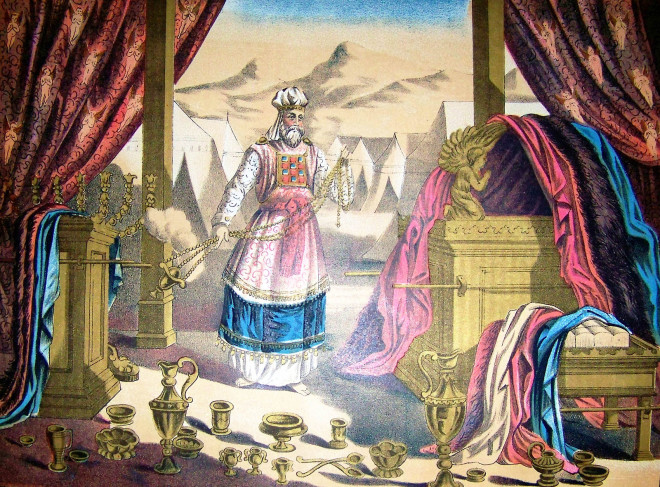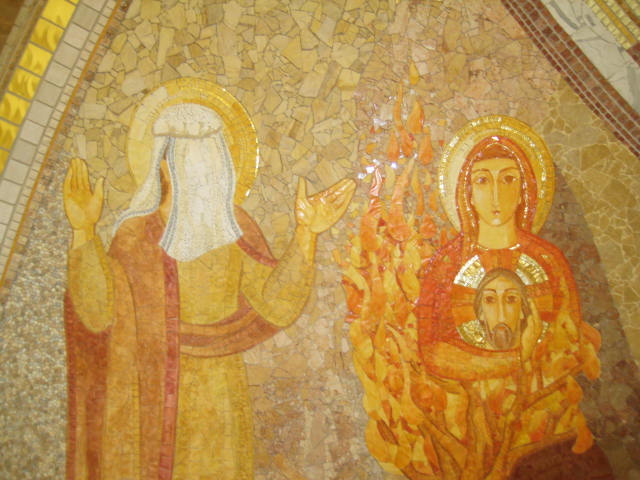One morning, I woke up feeling a little groggy from my allergy meds; I decided to listen to the book of Moses from the Pearl of Great Price. Funny how things work, but as I listened, I began to “wake-up” to the metaphor of clothing in the temple, and the metaphor of skin on our physical bodies and how they relate to living in different worlds, or “kingdoms.”
Clothing can be symbolic of our physical bodies. Clothing is a skin (in a way.) When we’re born into this world, we put aside our previous body, and we put on the clothing of a physical telestial body made just for us in the womb of our mothers. We’re born mortal. We have a new skin. It’s like putting on clothing, in a way. Our intelligence slips into the physical body clothing, and we become one with it.
One of my favorite stories is found in an ancient Christian text in the Book of Thomas — called “The Pearl.” The author relates the story of a traveler from heaven who must first take off his royal robe and place it in a treasure chest before he descends to earth. This change of clothing can symbolize the change from one type of life/body to another. Complete with a new name and a new world.
They (my heavenly parents) removed from me the garment of light, which they had made for me in love. And my purple robe, made exactly to fit me. (The Pearl, Hugh Nibley)
Sometimes you get a new name with a change as well as clothing. Abram and Sarai got the new names of Abraham and Sarah. I’m not sure what the change was, but Sarai could not have children until she became Sarah:
And God said unto Abraham, As for Sarai thy wife, thou shalt not call her name Sarai, but Sarah shall her name be.
And I will bless her, and give thee a son also of her: yea, I will bless her, and she shall be a mother of nations; kings of people shall be of her. (Genesis 17:15-16)
Almost all of the people who have lived on this mortal earth only change their “clothing” of a mortal body to a spirit when they die (another type of birth.) Some of my friends years ago talked about wanting to get “twinkled” — as in becoming translated in the twinkling of an eye. We always just laughed about it — thinking how great that would be. Argh, mortality can be rough.
And he that liveth in righteousness shall be changed in the twinkling of an eye, and the earth shall pass away so as by fire. (D&C 43:32)
Wherefore, children shall grow up until they become old; old men shall die; but they shall not sleep in the dust, but they shall be changed in the twinkling of an eye. (D&C 63: 51)
But, depending on God’s timeline, we may progress to putting on a new type of body — we may get a new clothing of skin — the translated terrestrial body. Wouldn’t that be great? Enoch and those of his city were translated. It happened to others as well — Moses, John the Beloved, the three Nephites — and from Jewish tradition: Serah, Bithiah, and others. (The Triumph of Zion, p 53 -54.) However, I believe we should not focus on that, as we have much to do and learn in the here and now.
I realized that when you change clothing in the temple, it signifies a change in your body — a type of glory corresponding to a specific world. The change of clothing is symbolic of a real change of body. I used to always think of the clothing as just that — clothing. And now, since you don’t make as many changes in the clothing in the temple, you may miss that symbolism.
I don’t know what a translated person looks like, nor do I know what a celestial being looks like. I guess I’m just aware of mortals. But according to scripture, those of a higher kingdom do not usually stand on the lowly earth when they appear to mortals — Moroni, for example, stood above the earth, for he has a different body:
While I was thus in the act of calling upon God, I discovered a light appearing in my room, which continued to increase until the room was lighter than at noonday, when immediately a personage appeared at my bedside, standing in the air, for his feet did not touch the floor. (Joseph Smith History 1:30)
Another example is Moses. Being in the presence of God would either kill you or, if you qualified, cause your skin to shine or glow. When Moses came down from Mount Sinai, his face was so bright with holiness that no one dared to look at him. He wore a veil when he spoke to his people and took it off when he spoke with God. (Exodus 34: 34-35)
He had to wear a veil whenever he spoke to the people in order to filter the Divine glare. (This is the source for Michelangelo’s depiction of Moses with horns: The words for “beaming” and “horns” have the same letters in Hebrew; an old Greek translation mistakenly rendered this verse, “And Moses had horns.”) (chabad.org)
Moses’s veil is symbolic of the veil worn in many ceremonies, primarily by women, to cover their brightness and glory — symbolic of having a higher body of glory or having been in the presence of the Lord’s glory. In the Jewish marriage ceremony, the bride’s face is veiled:
When the bride and groom stand under the chupah (marriage canopy), they are in an elevated state, as they are about to unite as one. In the bride, this elevated state is more revealed. She radiates a special holiness; the Divine Presence (Shechinah), the feminine aspect of G‑d, shines through the face of the bride.
This light is so intense that it must be veiled, just as the light that emanated from Moses’ face had to be covered. Holiness needs privacy. (chabad.org)
The veil is a clothing piece that means more than the cloth that it’s made from. It’s not modesty. Rebekah veils herself when she first meets Isaac:
Rebekah lifted up her eyes, and when she saw Isaac she dismounted from the camel. She said to the servant, “Who is that man walking in the field to meet us?” And the servant said, “He is my master.” Then she took her veil and covered herself. (Genesis 24:64-65)
The Doctrine and Covenants talks about different kingdoms of glory and different resurrected bodies — if you are “quickened” with a terrestrial body, you are, in fact, a terrestrial being, and in a terrestrial world — you have terrestrial clothing. We currently have been born into a telestial body, and we are living in a telestial world. Our skin clothing is telestial. We cannot abide by a higher glory in our current skin of clothing/body. (D&C 88)
When Adam and Eve partook of the fruit, they experienced a kind of birth — the birth of mortality. Upon eating the fruit, they became naked (like birth) — they lost their former light and glory, their former body of a terrestrial paradisical world. After this Fall from a higher glory, their new skin was what we have — mortal skin. Adam and Eve’s skin covering was probably their new mortal skin. It probably was not an actual piece of clothing. And because they could remember their former glorious body, they were not happy. Eve didn’t want to eat because of the change that came with that last piece of fruit from the tree of knowledge. Adam was so depressed he jumped off the cliff and had to be revived by angels. (see Books of Adam and Eve.) They may have forgotten their life before the garden, but they remembered their higher glory of the garden life, unlike us.
God teaches us by using symbols — in this case, clothing. He tells us that there is a significant difference in our bodies, depending on which world we inhabit or to which glory we are raised. It’s like putting on clothing, and each piece of clothing represents a different kind of body.
In the temple, we cloth ourselves in various pieces of clothing — as in the ancient temple in Jerusalem. We have a garment, an apron, a robe, a sash, a hat, or a veil. Putting on and taking off this clothing is symbolic of putting on and taking real bodily forms. You wear certain clothing in each of the kingdoms — the creation world room, the garden world room, the lone and dreary world of the telestial world room, the terrestrial world room, and the celestial world room.
You must have a type of clothing to move on, or more accurately, you must have that body to move on or live in that sphere. Spencer of Visions of Glory explained that the earth will change to a terrestrial state, and if we want to remain on it, we must also rise to that terrestrial body.
The garment given to Adam and Eve is the skin we all wear. We never take it off until we die. It protects us while we live in this mortal life, as skin is a covering of protection for all our vital organs. You must wear it all your life, and so we do. But we can reach the next level of glory. Not sure when that happens.
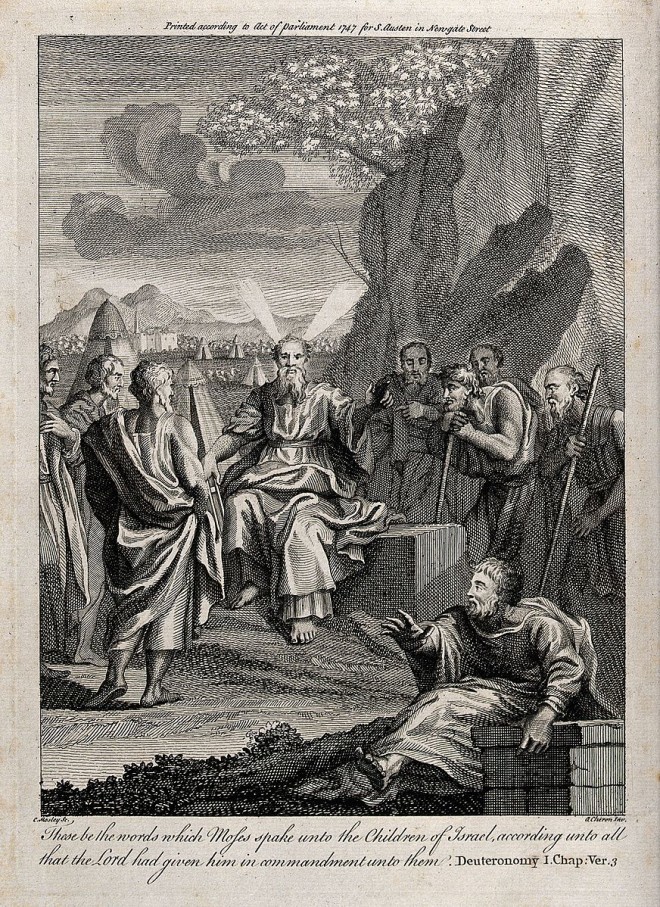
Moses, with his glory, depicted here as “horns.”
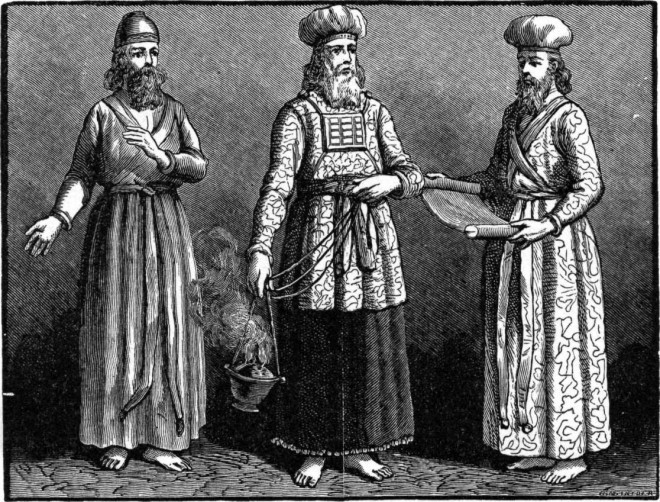
Priestly clothing of the Tabernacle
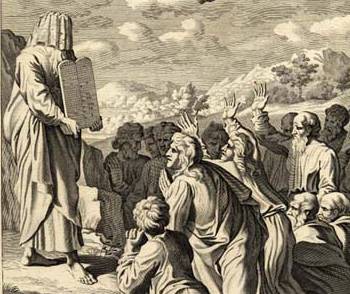
Veiled Moses
Originally posted Mar 20, 2016.

